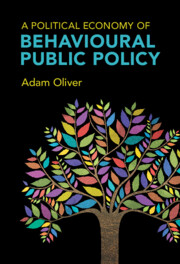Book contents
- A Political Economy of Behavioural Public Policy
- A Political Economy of Behavioural Public Policy
- Copyright page
- Dedication
- Contents
- Illustrations
- Preface
- Acknowledgements
- Introduction
- 1 Setting the Scene
- 2 Other Voices
- 3 A Kingdom of Ends
- 4 The View from Nowhere
- 5 Nourishing Flourishing
- 6 Anyone for Desert?
- 7 Private Matters
- 8 Public Matters
- 9 The Lives of Others
- 10 Summing Up
- Notes
- References
- Index
5 - Nourishing Flourishing
Published online by Cambridge University Press: 16 February 2023
- A Political Economy of Behavioural Public Policy
- A Political Economy of Behavioural Public Policy
- Copyright page
- Dedication
- Contents
- Illustrations
- Preface
- Acknowledgements
- Introduction
- 1 Setting the Scene
- 2 Other Voices
- 3 A Kingdom of Ends
- 4 The View from Nowhere
- 5 Nourishing Flourishing
- 6 Anyone for Desert?
- 7 Private Matters
- 8 Public Matters
- 9 The Lives of Others
- 10 Summing Up
- Notes
- References
- Index
Summary
I argue that one of the basic tenets of classical liberalism is that, if left free, people will cooperate and reciprocate with others as a means to pursue their own individual desires. Yet, if one is not careful, the rules and institutions that evolve within society over time may crowd out the motivation for people to reciprocate, and may instead crowd in their tendency towards selfish egoism. Policy makers therefore have a role to play in nurturing the conditions that, ideally, protect and foster the intrinsic human tendency to reciprocate. However, one should not try to force people to be cooperative; the tendency to reciprocate ought to be autonomously driven, and the extent to which people are driven to reciprocate – both positively and negatively – will often be influenced heavily by perceptions of desert. I finish by proposing a few ways for reciprocity to be nurtured: namely, for policy makers to emphasise the importance of this basic human tendency in their rhetoric; to address the extreme concentrations in income and wealth that have been allowed to accumulate in many countries over recent decades; and to decentralise, as far as possible, public policy decision making.
- Type
- Chapter
- Information
- A Political Economy of Behavioural Public Policy , pp. 73 - 87Publisher: Cambridge University PressPrint publication year: 2023

